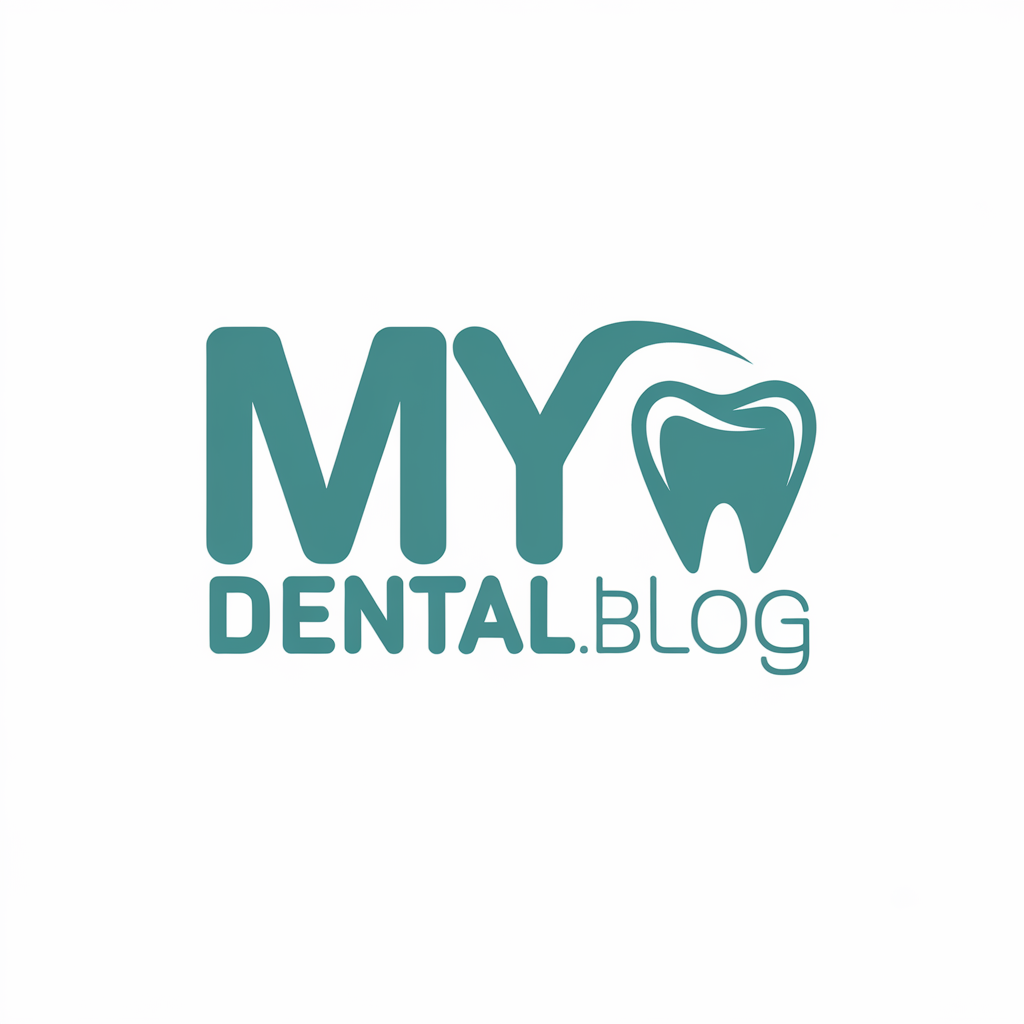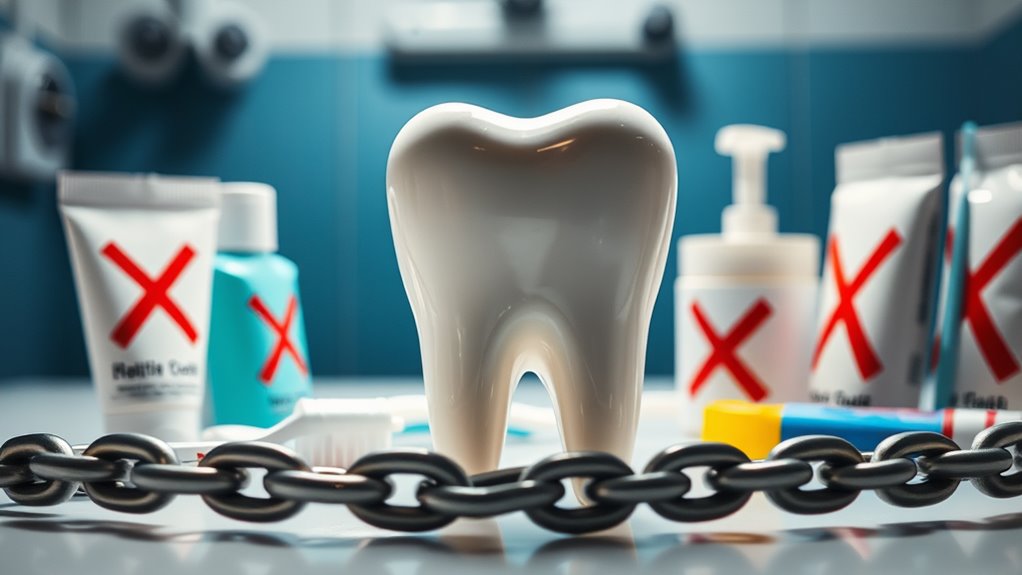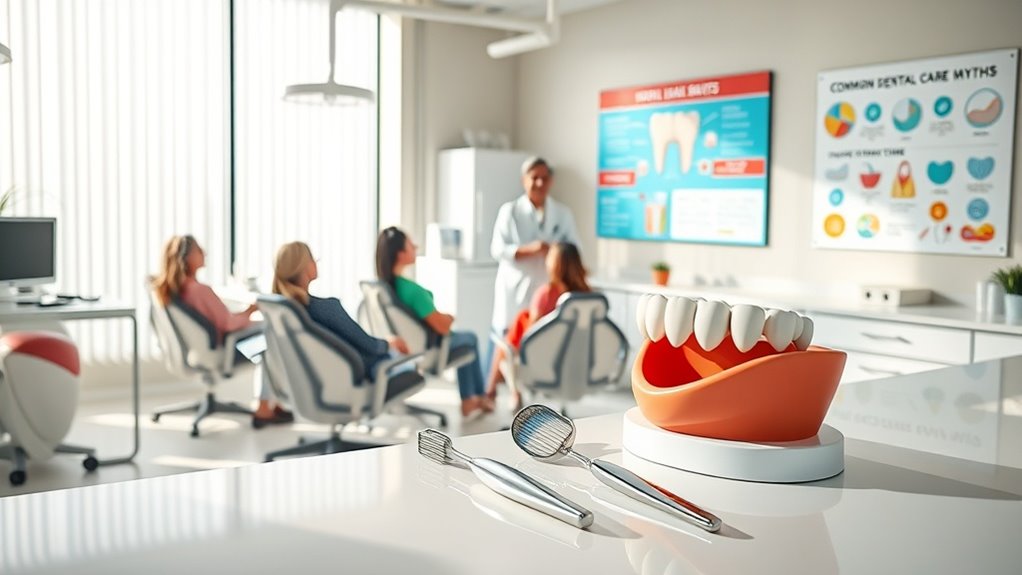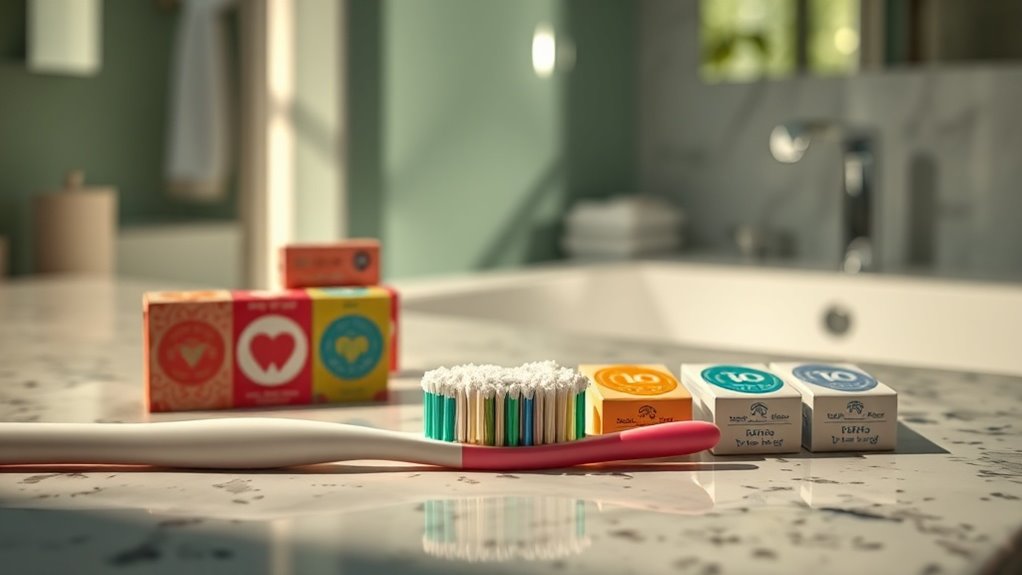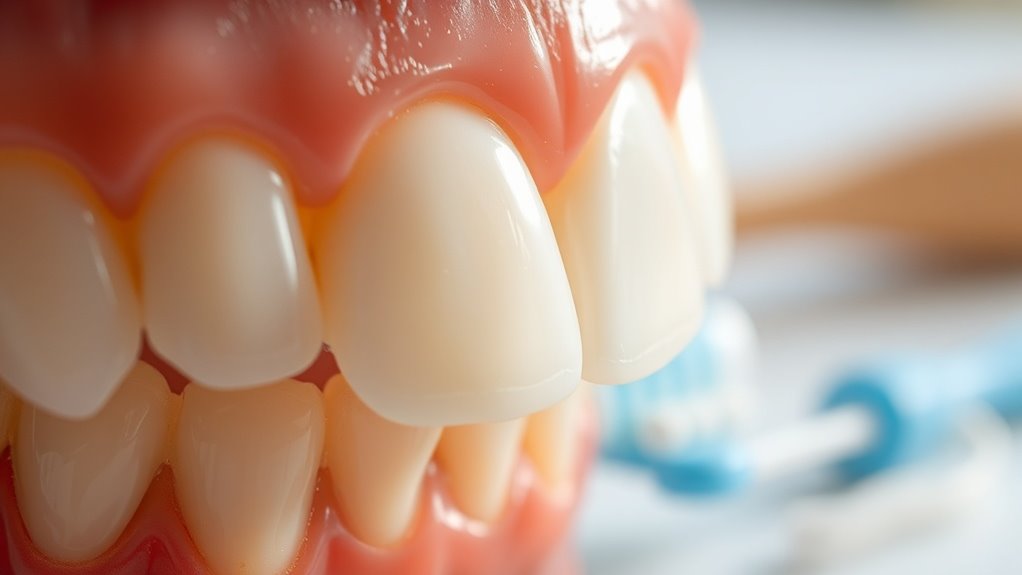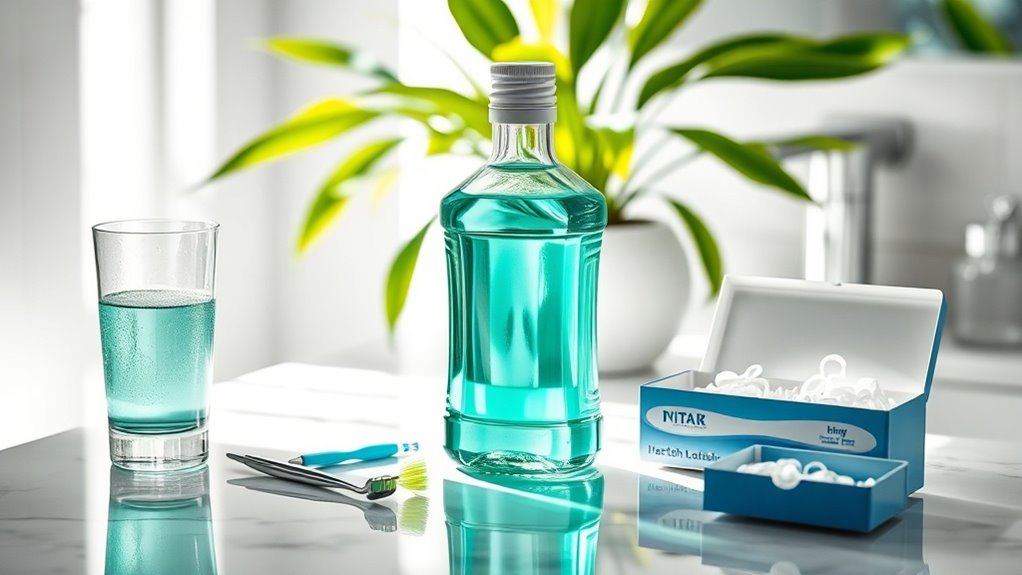You’ve Been Lied To! 10 Biggest Dental Myths Exposed!
You’ve probably heard a lot about dental care, but some of what you’ve been told might not be true. From the idea that sugar is the only culprit behind cavities to the belief that flossing is optional, these myths can lead you astray. It’s time to uncover the truth about your oral health. What you learn next could change the way you approach your dental habits forever.
Sugar Is the Only Cause of Cavities
While many people believe that sugar is the sole culprit behind cavities, the truth is more complex.
It’s easy to fall for dental myths, but understanding the real reasons behind tooth decay can help you take better care of your smile. Cavities form when bacteria in your mouth feed on not just sugar, but also carbohydrates like bread and pasta. These bacteria produce acids that erode tooth enamel, leading to decay.
Additionally, poor oral hygiene practices can contribute to cavity formation. If you don’t brush and floss regularly, plaque builds up, creating a perfect environment for cavities to thrive.
Factors like dry mouth and certain medications can also play a role. Genetics influences susceptibility to cavities, so the next time you hear someone say sugar is the only villain, remember that it’s just one piece of a larger puzzle.
Educating yourself on these dental myths can empower you to maintain a healthier mouth and a stronger sense of community.
Brushing Harder Means Cleaner Teeth
Many people think that brushing harder guarantees cleaner teeth, but that’s a common misconception. In reality, applying too much pressure can damage your gums and enamel, leading to more problems than benefits.
Here are three better practices to keep your smile healthy:
-
Use a Soft-Bristled Brush****: This type of brush effectively cleans while being gentle on your gums.
-
Focus on Technique: Use small, circular motions rather than scrubbing aggressively. This helps remove plaque without harming your teeth.
-
Brush for Two Minutes: A consistent brushing routine ensures you’re giving all areas of your mouth the attention they need. Additionally, remember that gentle techniques can significantly improve your overall oral health.
You Should Brush After Every Meal
Brushing your teeth after every meal might seem like a good idea, but it can actually do more harm than good. When you brush right after eating, especially if you’ve consumed acidic foods, you risk damaging your enamel. Instead, wait at least 30 minutes to allow your saliva to neutralize the acids in your mouth. This time is essential for remineralization of enamel, which helps maintain tooth strength. Here’s a quick comparison to help you understand:
| Brushing After Meals | Better Alternatives |
|---|---|
| Can damage enamel | Wait 30 minutes to brush |
| May lead to gum irritation | Rinse with water after meals |
| Doesn’t remove all food debris | Use dental floss regularly |
| Can cause tooth sensitivity | Chew sugar-free gum instead |
Whitening Treatments Damage Tooth Enamel
Although whitening treatments can give you a brighter smile, they often come with hidden risks, particularly when it comes to your tooth enamel.
Many people worry that these treatments can lead to damage, but it’s important to separate fact from fiction. Here are three key points to consider:
-
Concentration Matters: Higher concentrations of whitening agents can increase the risk of enamel erosion. Always follow guidelines and consult your dentist for safe options.
-
Sensitivity Issues: Many users experience increased tooth sensitivity after whitening. This sensitivity can indicate that your enamel might be affected, so listen to your body.
-
Professional vs. At-Home: Professional treatments are generally safer and more effective than over-the-counter products. Dentists can tailor the treatment to minimize risks.
-
Consulting a dentist ensures a personalized and safe whitening plan to help avoid potential damage to your enamel.
You Don’t Need to See a Dentist Until You Have Pain
Ignoring dental visits until you feel pain can lead to bigger problems down the road. Many believe that pain is the only sign of trouble, but that’s far from the truth. By the time you’re in pain, you might already have advanced issues like cavities or gum disease.
Regular check-ups allow your dentist to catch these problems early, often preventing painful experiences and costly treatments later. Additionally, gum disease can significantly impact your overall health, including increasing your risk for heart-related conditions.
Consider your dental health as part of your overall well-being. Just like you wouldn’t skip your annual physical, you shouldn’t skip your dental visits. They help you maintain a bright smile and can boost your confidence in social settings.
Plus, being part of a community that values proactive care can inspire others around you to do the same. So, don’t wait for discomfort; make that appointment and take charge of your dental health today!
Dental Visits Are Only for Cleanings
Many people assume dental visits are solely for cleanings, but they’re much more than that.
Regular check-ups play a crucial role in maintaining your oral health. Here are three essential reasons to see your dentist beyond just cleanings:
-
Early Detection: Your dentist can spot issues like cavities or gum disease before they become serious problems, saving you time and money in the long run.
-
Customized Care: During visits, your dentist can tailor advice that fits your specific needs, whether it’s about diet, hygiene practices, or even cosmetic options.
-
Preventive Treatments: Dentists may recommend fluoride treatments or sealants to protect your teeth, helping you avoid more extensive procedures down the line.
Natural Remedies Are Always Safe for Oral Health
While natural remedies can seem like a safe and appealing alternative for maintaining oral health, it’s important to remember that not all of them are without risks. Some ingredients can cause irritation or allergic reactions, and their effectiveness isn’t always backed by science. Before diving into the world of natural remedies, consider the following:
| Remedy | Potential Risks | Effectiveness |
|---|---|---|
| Coconut Oil | May cause stomach upset | Limited evidence |
| Baking Soda | Can erode enamel if overused | Effective for whitening |
| Tea Tree Oil | Can cause allergic reactions | Antimicrobial properties |
| Apple Cider Vinegar | Can erode enamel and irritate gums | Mixed results |
It’s great to explore natural options, but consult your dentist before trying new remedies. You want to ensure your journey to oral health is safe and effective for you and your community!
Baby Teeth Don’t Matter
Some people believe that baby teeth aren’t important since they’re temporary, but that’s a misconception.
Baby teeth play a crucial role in your child’s development and overall oral health. Neglecting them can lead to serious issues down the road.
Here are three reasons why you should care about baby teeth:
-
Foundation for Adult Teeth****: Healthy baby teeth guide adult teeth into proper alignment. If they’re lost too early, it can cause crowding or misalignment.
-
Eating and Speaking: Baby teeth help your child chew food properly and develop clear speech. Losing them too soon can hinder these essential skills.
-
Preventing Cavities: Just like adult teeth, baby teeth can get cavities. Keeping them healthy reduces the risk of infections that can affect adult teeth as well.
Chewing Gum Can Replace Brushing
Although chewing gum can be a helpful addition to your oral care routine, it definitely can’t replace brushing your teeth. While gum, especially sugar-free varieties, can help stimulate saliva production and neutralize acids, it lacks the cleaning power that brushing provides.
Here’s a quick comparison to clarify:
| Aspect | Chewing Gum | Brushing |
|---|---|---|
| Plaque Removal | Minimal | Effective |
| Stain Removal | Limited | Comprehensive |
| Fresh Breath | Temporary | Long-lasting |
Flossing Is Optional
Many people think flossing is optional, but it’s actually essential for maintaining good oral health. Skipping floss can lead to plaque buildup between your teeth, increasing the risk of cavities and gum disease.
You’re not alone in wanting to keep your smile bright and healthy—flossing helps you achieve that.
Here are three reasons why you should make flossing a non-negotiable part of your routine:
-
Removes Plaque: Flossing gets rid of food particles and plaque where your toothbrush can’t reach.
-
Prevents Gum Disease: Regular flossing reduces the risk of gingivitis and other gum issues.
-
Freshens Breath: By cleaning between your teeth, you help eliminate bad breath caused by trapped food.
